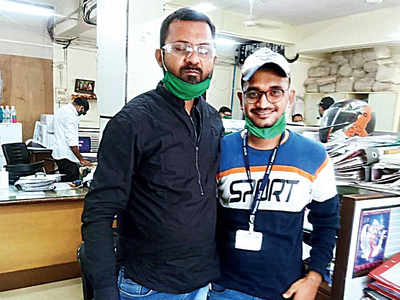
Don’t view Covid-19 diagnosis as an end: Survivor
by Yogesh NaikJunior engineer in BMC who beat the disease is now helping build 1,200-bed isolation centre
It’s only been four days since he resumed work after recovering from Covid-19 and Chetan Rathod is back on the frontline. The 28-year-old junior engineer with the BMC’s C ward office is now supervising the construction of a 1,200-bed isolation facility on the Police Gymkhana grounds in Marine Lines.
Rathod, who tested positive for the virus on March 29, said he is unsure where he picked it up. “On March 24, I visited Bhendi Bazaar as part of a routine vigilance check. I may have contracted it then.”
Two days later, he developed a fever and then a cough. Aware that early interventions go a long way in treating Covid-19, he got himself tested on March 27.
The test results confirmed his fears. Rathod spent the next 11 days fighting the virus at Kasturba Hospital. “Since it was early days of the pandemic, the protocol was still being worked out. There was no special treatment for BMC employees.
“I was not critical and so, was kept in a ward with non-critical patients,” he said.
He was later shifted to a quarantine centre in Andheri West.
Once his second test returned negative, he was allowed to go home. Unwilling to share his diagnosis with his parents, who live in Yavatmal and have cardiovascular problems, the Chinchpokli resident moved into a friend’s vacant house in Badlapur to recover.
But away from work for so long, Rathod became restless. Health Minister Rajesh Tope’s clarion call to essential service workers, asking them to report to work to bolster the battle against Covid-19, prompted Rathod to return. He resumed work in the C ward’s maintenance department on May 20, where he was welcome by thrilled colleagues
“I am taking all precautions while using gloves, masks and sanitisers,” he said.
Rathod has volunteered to donate his blood plasma. The plasma—the near-clear liquid left behind after red and white blood cells and platelets are removed from the blood—is considered to be carrying virus-fighting antibodies and has been used on an experimental basis to boost a critical Covid- 19 patient’s immune system. There isn’t enough evidence to show that its administration can be used a routine treatment for Covid-19 and it entails life-threatening risks.